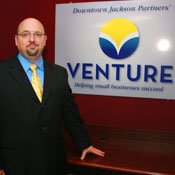As Wes Holsapple II walks through the soon-to-be filled offices on the second floor of the Regions Plaza building on Thanksgiving eve, his mind is far from turkey and stuffing. As the executive director of the Venture Incubator, Holsapple is focused on creating a hub to help small business owners flourish. Earlier this year, Downtown Jackson Partners created the nonprofit and provided funds for its start up.
Cities such as Little Rock, Birmingham and Baton Rouge have created business incubators. If Holsapple has his way, about 60 Jackson businesses will use the Capitol Street space by the end of the second quarter of 2011. The incubator has different levels of membership, and clients can lease an office or use the organization for training, development and networking.
The Nashville native moved to Jackson in the early 1980s and has worked as an area manager and trainer for Dale Carnegie & Associates, a global self-improvement and professional training company. Holsapple, 48, also owned a Business Networking International franchise until 2005.
What is the incubator's goal?
Businesses that get started often times have a very high failure rate. Many times it's because they don't have the capital to get started. They don't have the money it takes to have an office facility, and also they (may) have the coaching, training and mentoring that colleges teach, but the implementation of it isn't there. So what we are doing is building a community of successful business people to bring those folks together, for each of them to contribute their genius to the clients in
our facility.
What is your role?
My role is to tell the story of the incubator to the community and also to businesses. (My role) is to help them get in, and then contact corporations like Entergy and other companies and say: "We have this many people wanting to start small businesses in the area. They want to come to the area because they believe in it. Would you be willing to help us with our operating expenses?" And since we operate as a 501(c)(3) nonprofit, our focus, as with all incubators, is to lower the expenses of our new business clients.
How is the incubator different from other business-development groups?
At Jackson State University's small business-development center, (clients) have an office. ... But they also get use of the conference room and the copier and the receptionist and all those shared services. These businesses can lower their cost, but they don't have the benefit of training and development. ... (The Mississippi e-Center at JSU) is primarily tech focused, so someone who wants to start a janitor business, the e-Center is probably not a good fit.
What are some skills that small business owners need to succeed?
A lot of people have a dream, they have an idea, they are enthusiastic about it, but they don't have a business plan that talks about how they are going to accomplish what they want to do. Who else needs to be involved? What about financing, cash-flow projects? Who is your market, and how are they different? ... Can they give a 30-second elevator talk? There has to be a compelling message that these business owners are using to grow their business.
What are the pros and cons of starting a small business in Jackson?
The positive side is that we have such a diverse industry of government, education and medical that those types of industries aren't going to suffer the ups and downs like Detroit that has the automobile industry. ... Jackson has consistently ranked high as a good place to start a business, raise a family and get an education. I think there is a tendency that Mississippi has been kicked so long that the attitude is: "Let's find something to kick. And, oh, look. There's Mississippi." ... I think one of the challenges is that we don't tell our story well, and that's something we need improvement on.
What happens when clients want to expand their businesses?
It depends on the client. There might a person that comes to us and says, "I have an office in my home in Clinton, but I would love to have an office downtown and meet clients in a conference room." For $250 a month, they can do that, plus they can get all the training, development. This is not a moneymaking thing. We are a nonprofit. Every decision we make is on how we can help the clients succeed. We want them in one to three years to graduate out. ... But let's say that a client starts as a sole proprietor and then needs to hire people. Now would be a good time to move out of the incubator, but they can stay as an affiliate and get the training they need.
What advice do you have for people who have a plan but lack financing?
If someone comes to me and needs help with financing, I pick up the phone and introduce (him or her) to the folks they need to be involved with. ... Every day there are new opportunities coming around. There is new money that is being made available but you just have to meet certain requirements. But if you don't know those requirements, or if you don't know how to get started in meeting those requirements, then the money is inaccessible.
For information about the Venture Incubator, visit http://www.ventureincubator.org.



Comments
Use the comment form below to begin a discussion about this content.
comments powered by Disqus